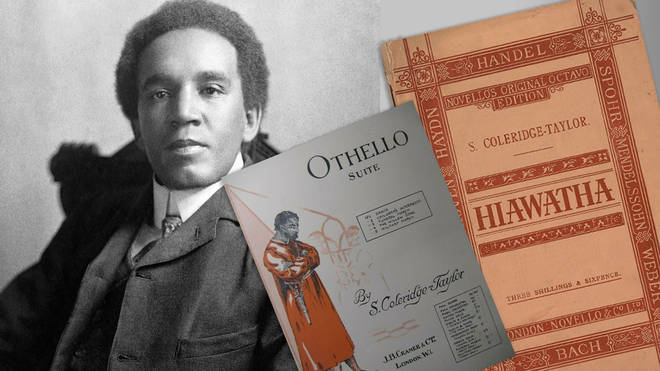British composer Samuel Coleridge-Taylor is famous for rich orchestral works and brilliant instrumental writing. Here’s where to start with his music.
Samuel Coleridge-Taylor was an English composer and conductor, known for his Violin Concerto in G minor, The Song of Hiawatha and his arrangement of African-American spiritual, ‘Deep River’.
A contemporary of British composers Ralph Vaughan Williams, and Gustav Holst, he studied with Charles Villiers Stanford at the Royal College of Music in London. He first gained recognition for his ‘Ballade in A Minor’, after Edward Elgar recommended him to The Three Choirs Festival, prompting publisher August Jaeger to describe the music as “genius”.
Despite a tragically early death in 1912, aged just 37, Coleridge-Taylor composed plenty of brilliant music that remains with us today.
Here’s where to start with discovering Coleridge-Taylor’s rich orchestral music and sensational instrumental works.
The Song of Hiawatha
One of Coleridge-Taylor’s most famous works, The Song of Hiawatha is a three-section choral work of epic proportions.
Of the three sections, the first, ‘Hiawatha’s Wedding Feast’, became especially famous, and put Coleridge-Taylor on the map after its premiere at the Royal College of Music, under the baton of his teacher, Charles Villiers Stanford.
Violin Concerto in G minor
Coleridge-Taylor’s Violin Concerto in G minor is packed with gorgeous rich melodies and sumptuous orchestral writing.
Violinist Elena Urioste, who has performed the piece with Chineke! Orchestra among others, has described it here as “music that cuts straight to the heart” and “that happens to be incredibly well-written for the violin — the idioms fall quite naturally in the hands — and to me the language needs very little in the way of gilding.”
Symphonic Variations on an African Air
Coleridge-Taylor composed his Symphonic Variations on an African Air in 1906. It’s based on an African-American song, ‘I'm troubled in mind’ and follows a theme and variations structure.
It’s written for a large orchestra and is rich with timpani rumbles, wonderful brass writing, string flourishes and magical tuneful melodies.
Deep River (traditional)
‘Deep River’ is an anonymous African-American spiritual, and Coleridge-Taylor took the song, and transcribed it in a Brahmsian style for the piano, as part of his 24 Negro Melodies series of works.
“What Brahms has done for the Hungarian folk music, Dvořák for the Bohemian, and Grieg for the Norwegian, I have tried to do for these Negro Melodies,” Coleridge-Taylor powerful music.
Ballade in A Minor
One of Coleridge-Taylor’s early works, the Ballade in A Minor was premiered at The Three Choirs Festival and led his publisher at Novello Music, August Jaeger, to describe him as a “genius”.
The one-movement orchestral piece echoes the symphonic styles of Tchaikovsky and Dvořák, and it’s full of ravishing melodies and lush string moments.
Clarinet Quintet
As well as orchestral works, Coleridge-Taylor composed chamber works – and his Clarinet Quintet is , but with the the former’s distinctive modern voice.
The masterful piece, the story goes, was the result of Coleridge-Taylor’s teacher, Stanford, saying that no composer was up to tackling the clarinet quintet since Brahms, without copying Brahms’ style. Well, Coleridge-Taylor was, because he went “challenge accepted” and Stanford was forced to say, “you’ve done it, me boy!”
Nonet in F minor
Another chamber work, the Nonet in F minor joins the voices of a string quartet with a selection of brass-winds – that is the oboe, the clarinet, the horn, the bassoon and the piano.
It’s only the second of Coleridge-Taylor’s officially chronologically catalogued works, or works with an ‘opus number’, and it’s built around modern, syncopated rhythms that accompany soaring, tuneful melodies.
Christmas Overture
Coleridge-Taylor takes traditional Christmas carols and wraps them up in orchestral greatness for this Christmas Overture.
Spot favourite festive tunes from the traditional ‘Good King Wenceslas’, ‘God Rest Ye Merry, Gentlemen’ and ‘Hark! The Herald Angels Sing’, among others.
Sea Drift
Sea Drift is an a cappella choir piece from 1908 in which Coleridge-Taylor sets an evocative poem by American writer and poet Thomas Bailey Aldrich.
“See where she stands, on the wet sea-sands / Looking across the water: Wild is the night, but wilder still / The face of the fisher’s daughter…”
Othello Suite
Composed a year later, in 1909, Coleridge-Taylor’s Othello Suite was commissioned by Herbert Beerbohm Tree for his production of the Shakespeare play of the same name at His Majesty’s Theatre in London’s West End.
The incidental music is rich with haunting melodies, racing dances and a lilting ‘Children’s Intermezzo’ that evokes calm and innocence.
